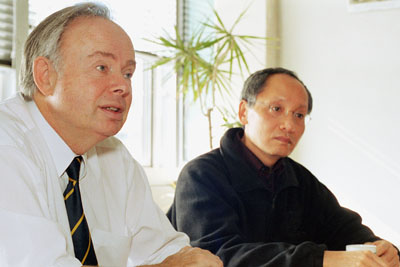Untitled Document
Cobra allies its way to the top
The Cobra research school at TU/e was named the best
Dutch research school in the NWO evaluation of 1998. But this
is not nearly enough, say director prof.dr. Joachim Wolter and
prof.ir. Djan Khoe. Cobra (Communication Technology, Basic Research
and Applications) wants to become the top northern European institute
in the field.
 This ambition has already led to
alliances with universities in Belgium, Germany and recently in
Denmark. Together they are calling themselves EITT European
Institute of Telecommunication Technology. The four institutes
have about 120 PhD students and 60 staff on their payrolls.
This ambition has already led to
alliances with universities in Belgium, Germany and recently in
Denmark. Together they are calling themselves EITT European
Institute of Telecommunication Technology. The four institutes
have about 120 PhD students and 60 staff on their payrolls.
Cobra's research focuses on enabling technologies for developing
fully optical communication networks. "In time, the only
electrical connection left will be the plug in the power point",
says Khoe. "And it isn't an electronic highway, it's already
turning into an optical highway. Photons have more powerful physical
properties than electrons."
The group hopes to increase the transport capacity of the internet
by a factor of one thousand. This search for extra capacity sometimes
forces researchers to look for new and unconventional solutions.
Wolter says this is where fundamental research is necessary.
"Also, it's impossible to limit ourselves to the Netherlands",
he adds. "Telecom is such a big global field that we can
all do better if we work with other top institutes in developing
new opportunities for material concepts, optical chips and fast
high capacity systems."
Cobra's growing international status was illustrated earlier this
month with the organisation of the 27th European Conference on
Optical Communication. The conference attracted two thousand participants
from all over the world. Researchers from the USA and Japan were
granted special dispensation to fly to the Netherlands after their
employers had first grounded them due to the terrorist attacks
on New York and Washington D.C.
No complaints
Because of its new official status as a top Dutch research school,
Cobra received a grant of 42 million guilders for 1999 to 2005
from the ministry of Education. "We came second out of 110
institutes. We were one of six groups named as top institutes,
so more than one hundred other institutes were disappointed. Naturally,
we can't complain about the way we've been treated. But many others
feel they haven't received the recognition they deserve",
says Wolter.
Cobra is also backed by a number of commercial businesses. There
are strong alliances in place with Lucent, KPN, Philips, JDS Uniphase
and AGERE Systems, among others. "These are not paper alliances.
Lucent has stationed people at TU/e to work for Cobra because
the infrastructure they need is here", Khoe emphasises.
Together with these and other companies, Cobra is one of the players
in 'Kenniswijk', a digital city project in Eindhoven and Helmond
which aims to connect whole districts to digital services through
wide band infrastructure. This will allow companies to experiment
with various ideas for products and services.
Even though there is some subsidy in place to realise the necessary
infra-structure the costs are not yet covered. Wolter says he
expects companies will become more willing to participate and
to invest as Cobra and EITT establish themselves more clearly
as the scientific 'parents' of field communication technologies.
Cobra's photonics programme is split into three research groups
for photonic materials, photonic systems and photonic components,
led respectively by prof.dr. Wolter, prof.ir. Khoe and prof.dr.ir.
Smit. They all have ties to Philips and make a very international
group. Wolter came to the Netherlands in the sixties from Marburg,
Germany. Khoe says his ancestors were pirates in the South China
Sea, but he himself migrated to the Netherlands from Indonesia
when he was young. Cobra employs staff from many countries, including
Italy, Spain, Russia, China, Japan and India./.







